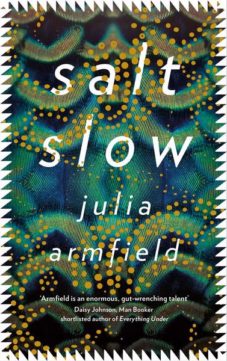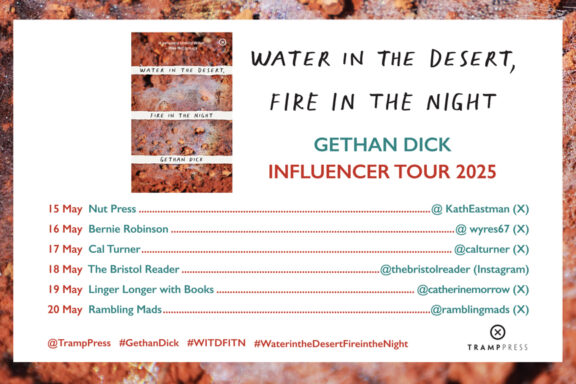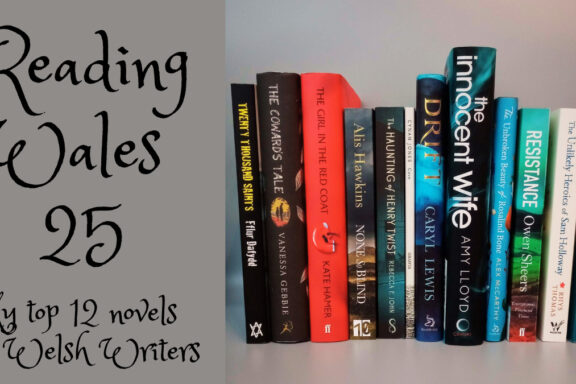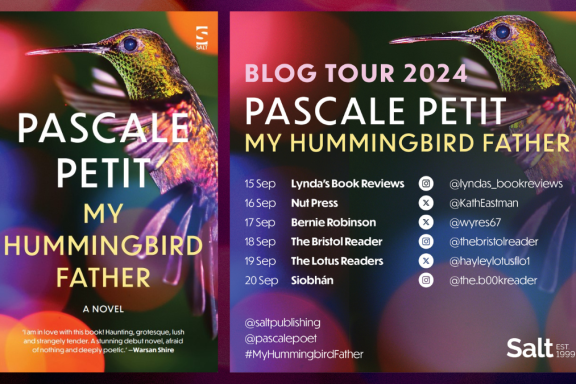
I bought Julia Armfield’s much-anticipated debut story collection, Salt Slow, shortly after it came out in May this year. It’s since been shortlisted for the Sunday Times / Young Writer of the Year Award and, with the winner due to be announced on Thursday evening, I wanted to share my thoughts on it.
In her brilliantly inventive and haunting debut collection of stories, Julia Armfield explores bodies and the bodily, mapping the skin and bones of her characters through their experiences of isolation, obsession, love and revenge.
Teenagers develop ungodly appetites, a city becomes insomniac overnight, and bodies are diligently picked apart to make up better ones. The mundane worlds of schools and sleepy sea-side towns are invaded and transformed, creating a landscape which is constantly shifting to hold on to its inhabitants. Blurring the mythic and the gothic with the everyday, Salt Slow considers characters in motion – turning back or simply turning into something new entirely.
Beautifully packaged by Picador, this is a fantastic collection of stories about women and their bodies, which relates their evolution in a society that resembles our own but which is also altogether darker and differs to it, or is other.
I may be long past those teenage years spent craving the company of boys as much as the main character in Mantis, the first story in the collection, but she’s also someone who suffers from a debilitating skin condition and this eczema sufferer so identified with her when she describes this: “I dream in sheddings – spend my nights sunk deep beneath sets of teeth and fingernails, the suffocation of skin cast off and left unbodied.”
If the first story chimed with me, the second only served to suggest where we might be heading, if sleep continues to be squeezed out to make room for more work and leisure activities and is no longer seen as fulfilling an essential need. “…our mother told us warning stories about the proliferation of ghosts in big cities… towns that seethed with spectres, mime the permanent unsettlement of a city night” “insisting that cities could not be lived in but only haunted.” In The Great Awake, Sleeps detach from their humans, which leads to conflict between those belonging to couples, uneasy housemates and colleagues for everyone else and a source of jealousy and envy for those left without one and still able to sleep. “It was described more commonly as a phenomenon than a disaster; … an amputation of sorts, the removal of the sleep state from the body… Television became a gradual sea of doubles, of familiar faces and their silent, unaccustomed companions.” It sounds as if this is a state we could evolve into, if we continue to give sleep such low priority.
In The Collectables, three friends mark the last of them being dumped with a bonfire of the keepsakes and possessions accumulated while together with the errant boyfriend. When the dumpee begins a new collection, it escalates into something altogether more worrying. It also might make you think twice about being friendly towards relative strangers, especially if you’re a pizza delivery guy.
Formerly Feral is a brilliant nod to Angela Carter with its twisted take on a dark fairytale where a father and daughter find themselves becoming involved with a neighbour who adopts a wolf. This is one story which has really stayed with me and it’s fascinating to follow the evolving relationships between those left behind in the house, those who left the family home, and those newly moved in.
Stop Your Women’s Ears with Wax not only shows how music can bring people together but how it has the power to affect you, stir up your emotions and even change the way you feel or behave. I loved the mystery of what lay behind the black curtain separating the band from its manager and roadies, and the cackles sometimes heard; how no one could quite remember when they’d first heard the band play; and the growing reports of disturbing events. Girls behaving badly on tour.
Granite is a salutary tale with a self-fulfilling prophecy and how we might be better off living in the moment and appreciating what we have; how so often we are our own worst enemies, and why we shouldn’t always listen to our friends’ advice, no matter how well-meaning they appear to be.
Smack is the wistful, edging towards melancholy story of Nicola, a woman in the middle of an acrimonious divorce who returns to the beach house where she and her ex spent happier days, times “when the house was furnished with more than the memory of things.” Only her belongings remain now but they feel marooned, much like what’s happening outside where “the jellyfish came with the morning – a great beaching, bodies black on sand… The ocean empties, a thousand dead and dying invertebrates, jungled tentacles and fine, fragile membranes blanketing the shore… spectral… as though the sea has exorcised its ghosts.”
Cassandra After in which a grieving woman is visited by her dead girlfriend one evening is gruesomely good and has some great description in between their conversation and the Catholic funeral rites and customs she describes while looking back over their relationship: “The oysters were good, cheaply decadent; pucker-salt and bone and tide.”
And it ends as strongly as it started with the title story, Salt Slow, the last in the collection, set in a dystopian future where the world has flooded. Despite this, and the prospect of giving birth in a rowing boat for the main character, Julia Armfield makes time for some nice touches of humour: “The university towns drowned quickly – porous stone, too much paper.”
I’m already looking forward to re-visiting these women and their stories; Salt Slow is an exciting, yet also unsettling, collection where the more fantastical and macabre elements were worked in seamlessly. I thoroughly enjoyed the haunting inventiveness of the stories in this collection.
Salt Slow by Julia Armfield is a short story collection published by Picador, an imprint of Pan Macmillan. It is available as an audiobook, ebook and in hardback with the paperback due out in March 2020. You can find it at Amazon UK or buy it from Hive instead, where every purchase you make helps support your local independent bookshop. You can find the author on Twitter.



Leave a comment